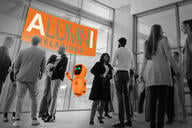You have /5 articles left.
Sign up for a free account or log in.

iStock
This year I lost on the job market, but I won with voters. On April 17 I was sworn in as a City Council member in Eau Claire, Wis. Correspondence may now be addressed to the Honorable Dr. Anderson, a title that strikes me as delightfully absurd, given how broke I am.
Last year at this time, I was still coping with the silence my carefully prepared job materials had elicited. Despite the years teaching (as a teaching assistant and also as an adjunct) at the School of the Art Institute of Chicago and the University at Buffalo, despite the M.F.A. and Ph.D., despite the book I published, I wasn’t offered a single interview. It was crushing.
But this year, I don’t mind the fact that I didn’t get an interview (again). This year I’m cruising the streets of my hometown with the windows rolled down, ready to work with 10 other elected officials to oversee a budget of $130 million and represent a district of about 12,000 people in a city of 70,000.
In 2015, I ran out of funding for my doctoral education and moved back to my parents’ house in Eau Claire to complete my dissertation. After years of living far from home, I was delighted to be able to spend so much time with my family, but the transition made me uneasy, too. My high school friends had left for jobs in bigger cities, for lives that seemed happier and more successful. I slid quietly back into my old bedroom and refused to come out. I thought a lot about Emily Dickinson. Also a poet, Dickinson lived with her parents, too. She hardly ever left the house, either.
Maybe a narrow life would help me think deeply, I reasoned. Maybe I could be like Dickinson. But I wasn’t happy. I felt like a ghost, haunting the ruins of my dreams while refreshing the Academic Job Wiki’s English literature page.
To be clear, my dreams weren’t for fame and fortune. I dreamed of doing the job I was trained to do and receiving a living wage, benefits and job security. This is a dream shared by many people outside academe.
My friends with law degrees struggle. My teacher friends struggle. My STEM friends struggle. I wonder if we are reaching the end of an era when education can be a pathway for economic mobility.
If the collapse of the academic job market has taught me anything, it’s that I am no different from a worker at McDonald’s. I grew up hearing that classist refrain “Do well in school -- unless you want a job flipping burgers.” I did do well in school and college. But then, as an adjunct, I earned something close to minimum wage. I’m inspired by the fast-food workers’ Fight for 15 movement. I hope academics emulate their success.
So when my city council considered a living wage ordinance, I went to the meeting and spoke my mind. I was surprised when a journalist chased me out after the meeting, wanting to interview me for the news. After years of job and publishing rejections, I was unprepared for the experience of someone running after me with a microphone, eager to hear more. I was even less prepared a few months later when a group of local leaders approached me about running for office.
Apparently, a decade of teaching and scholarly conversation has made me pretty good at extemporaneous speaking. Here in Wisconsin, politicians are cutting humanities programs, but running for office made me realize the usefulness of my humanities training. It made me a more effective candidate.
For instance, when I went door to door, my experience as a literary critic enabled me to quickly link individuals’ personal stories with larger themes and issues. I also realized how similar leadership is to college teaching. As a writing teacher, I worked to nurture students’ curiosity. I encouraged them to wonder why things are the way they are -- and articulate what it would take for them to be different. My favorite course-evaluation comment was “She made me think and wonder.” When I ran for office, supporters told me that they responded to me because I could articulate a vision. I helped them imagine how things could be different. I made them wonder.
The rigors of my academic training also prepared me to run for office. Coping with my fair share of rejection letters and checked-out students made me resilient. When I answered tough policy questions at a public forum, I was calm: the forum was a breeze compared to taking my oral exam.
After years of working alone on my dissertation, I was delighted to find myself working with others on a coordinated political campaign. Suddenly, I had teammates! And while politics has a reputation for being nasty, running for office made me feel more validated than grad school did.
Let me be clear that I worked with wonderful and supportive faculty members and a delightful cohort during grad school. However, the specter of the job market loomed over my grad school experience and, combined with my own impostor syndrome, provided me with plenty of self-doubt. Running for office, I was constantly encouraged. People I barely knew would grab my hand and exclaim, “Thank you so much for doing this!” or “You’ve got guts!” or “Give ’em hell!” or “We need you!” or even “What you’re doing takes a lot of courage, and I’m so grateful. How are you feeling?”
Yes, there were some low moments during the campaign. People said unkind things about me. Their words activated my shame about not getting a tenure-track job. I felt flawed and wrong. But when I reflected on my new role as a public figure, these remarks made me feel not wrong, but necessary.
Many people are concerned about how to survive, financially and emotionally, in an era of downward economic mobility. The things I feel ashamed of and afraid about are the very reasons my community needs my perspective. Running for office helped me recover from the shame of having a Ph.D. but not a tenure-track job. It was, believe it or not, a healing experience.
Academics and higher ed professionals are used to hearing that our work lacks “real-world” relevance. The effect of this kind of rhetoric can be silencing. We may feel that our voices matter most in small, highly specialized contexts. But I encourage you to explore the limits of your vocal range. You may be surprised to learn that when you speak, people listen. There are fantastic organizations, especially for women candidates, like Vote Run Lead, that train people to run for office and to “run as they are.”
One day, the powers that be will regret undervaluing and underemploying intellectuals. They will regret trashing science, sneering at philosophy and making it harder for students to afford an education. That day will come when we take their jobs.




